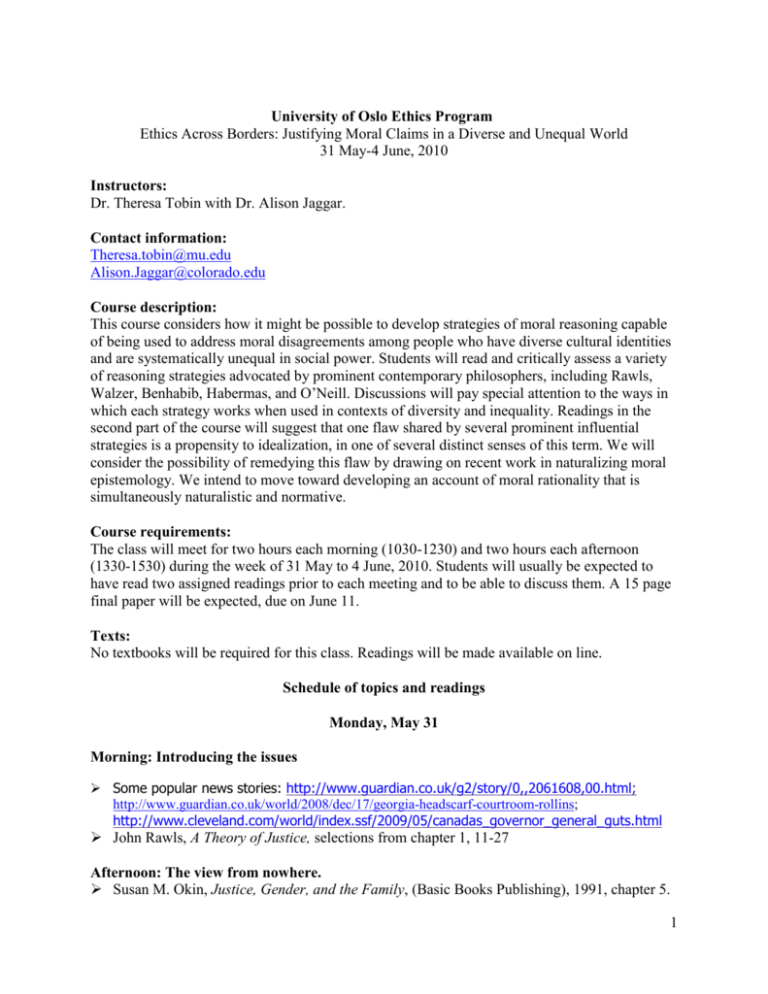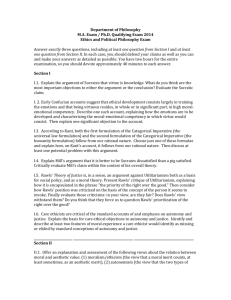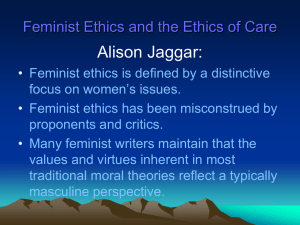Draft 17 April, 2010
advertisement

University of Oslo Ethics Program Ethics Across Borders: Justifying Moral Claims in a Diverse and Unequal World 31 May-4 June, 2010 Instructors: Dr. Theresa Tobin with Dr. Alison Jaggar. Contact information: Theresa.tobin@mu.edu Alison.Jaggar@colorado.edu Course description: This course considers how it might be possible to develop strategies of moral reasoning capable of being used to address moral disagreements among people who have diverse cultural identities and are systematically unequal in social power. Students will read and critically assess a variety of reasoning strategies advocated by prominent contemporary philosophers, including Rawls, Walzer, Benhabib, Habermas, and O’Neill. Discussions will pay special attention to the ways in which each strategy works when used in contexts of diversity and inequality. Readings in the second part of the course will suggest that one flaw shared by several prominent influential strategies is a propensity to idealization, in one of several distinct senses of this term. We will consider the possibility of remedying this flaw by drawing on recent work in naturalizing moral epistemology. We intend to move toward developing an account of moral rationality that is simultaneously naturalistic and normative. Course requirements: The class will meet for two hours each morning (1030-1230) and two hours each afternoon (1330-1530) during the week of 31 May to 4 June, 2010. Students will usually be expected to have read two assigned readings prior to each meeting and to be able to discuss them. A 15 page final paper will be expected, due on June 11. Texts: No textbooks will be required for this class. Readings will be made available on line. Schedule of topics and readings Monday, May 31 Morning: Introducing the issues Some popular news stories: http://www.guardian.co.uk/g2/story/0,,2061608,00.html; http://www.guardian.co.uk/world/2008/dec/17/georgia-headscarf-courtroom-rollins; http://www.cleveland.com/world/index.ssf/2009/05/canadas_governor_general_guts.html John Rawls, A Theory of Justice, selections from chapter 1, 11-27 Afternoon: The view from nowhere. Susan M. Okin, Justice, Gender, and the Family, (Basic Books Publishing), 1991, chapter 5. 1 Alison M. Jaggar, “Taking Consent Seriously: Feminist Practical Ethics and Actual Moral Dialogue," The Applied Ethics Reader, edited by Earl Winkler and Jerrold Coombs, Oxford: Blackwell, 1993. Tuesday, 1 June Morning: The views from particular places Michael Walzer, Interpretation and Social Criticism chapter 1 and Thick and Thin: Moral Argument at Home and Abroad chapter 2 Uma Narayan, “Cross-Cultural Connections, Border-Crossings, and “Death by Culture” from Dislocating Cultures, pp. 83-117 Afternoon: The view from constitutional democracies John Rawls, “Justice as Fairness: Political Not Metaphysical,” Philosophy and Public Affairs, 14:3 (Summer 1985), 223-231, 245-251. John Rawls, “The Reasonable and the Rational,” from Political Liberalism, Columbia University Press, 1993, pp. 47-54 Marilyn Friedman, “John Rawls and the Political Coercion of Unreasonable People,” in The Idea of a Political Liberalism: Essays on Rawls, edited by Victoria Davion and Clark Wolf, Lanham MD: Rowman and Littlefield, 2000. Wednesday, 2 June Morning: The view from everywhere Juergen Habermas “Discourse Ethics: Notes on a Program of Philosophical Justification,” in Moral Consciousness and Communicative Action, translated by Christina Lenhardt and Shierry Weber Nicholsen, Cambridge, MA: The MIT Press, 1990, pp 57-68; 86-94. Iris M. Young, “Asymmetrical Reciprocity: On Moral Respect, Wonder, and Enlarged Thought,” from Intersecting Voices: Dilemmas of Gender, Political Philosophy and Policy, Princeton: Princeton University Press, 1997. Afternoon: Idealization in moral philosophy Onora O’Neill, Toward Justice and Virtue, Oxford UP, 1996, chapter 2. Charles Mills, “Ideal Theory as Ideology,” Hypatia vol 20, no 3 (Summer 2005), pp. 165184). Thursday, 3 June Morning: Naturalizing Moral Epistemology? W.V.O. Quine “Epistemology Naturalized” from Ontological Relativity and Other Essays, New York and London: Columbia University Press, 1969, pp. 82-90. Margaret Urban Walker, “Seeing Power in Morality: A Proposal for Feminist Naturalism in Ethics,” in Feminists Doing Ethics, edited by Peggy DesAutels and Joanne Waugh, Totowa, NJ: Rowman and Littlefield, 2001, pp. 3-14. 2 Afternoon: Naturalizing Moral Methodology I Alison M. Jaggar, “Toward a Feminist Conception of Moral Reasoning,” in Morality and Social Justice: Point Counterpoint, with James P. Sterba, Milton Fisk, William A. Galston, Carol C. Gould, Tibor Machan and Robert Solomon, Lanham, MD and London, UK: Rowman and Littlefield, 1995. Theresa W. Tobin, “On Their Own Ground: Strategies of Resistance for Sunni Muslim Women” Hypatia, vol 22, no 3, (Summer 2007), pp. 152-174. Friday, June 4 Morning: Naturalizing Moral Methodology II Alison. M. Jaggar, “Globalizing Feminist Ethics,” Hypatia, 13:2 (Spring, 1998) pp. 7-31. Brook Ackerly, Political Theory and Third World Social Criticism, Cambridge UP, 2000, pp1-23 and chapter 2. Afternoon: Developing new strategies for moral reasoning Open 3







